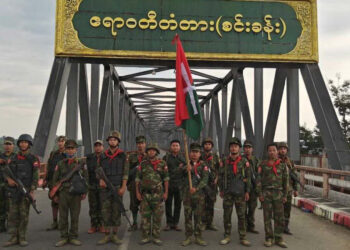YANGON — A local court in Yangon has barred the press from taking pictures and video recordings of a military officer’s wife who is facing trial for allegedly torturing her maid to death.
According to the Yangon South District Court in Thanlyin Township, the military officer, whose identity is not yet known by the press, requested that the Myanmar Press Council restrict the media from taking pictures and videos of his wife Theingi Su inside the court compound.
The court banned reporters from taking pictures and videos of Theingi Su in its precinct at her fifth trial on Wednesday, although it had not issued these restrictions in the previous four trials.
U Moe Wai, an information officer of the court, told the press not to use photos of the defendant taken at previous trials as well.
“The [request] letter dated July 4 was sent to us [by the military officer] by mail. It was not given to us in person,” he told reporters.
U Moe Wai said that the ban has nothing to do with the military officer’s request, but declined to explain further.
He told reporters not to publish photos of her appearing at the court, including getting into or out of the prisoner transport vehicle.
Khin Thandar Oo, also known as Kayin Ma, 38, a mother of four children, was working at the quarters of a military officer of the Inn Daing armored battalion in Yangon’s Hlegu Township.
She died within an hour of being sent home to Oh Po village in Twante Township by Theingi Su on May 19, citing her ill health.
According to the post-mortem examination, the woman died of injuries to her intestines, and her death could have been averted if she had been hospitalized in time.
The press council does not have authority to ban reporters from taking pictures or videos, secretary of the council U Thiha Saw told The Irrawaddy.
“The council doesn’t have the authority to instruct journalists on what to do or not do,” he said.
“Civilian defendants dare not complain about photos. But the officer has complained, so he must have some backing,” prosecution lawyer Daw San San Myint told The Irrawaddy.
The defense lawyer declined to answer The Irrawaddy’s question about the request. Theingu Su has covered her head as she came to and left the court in all of the previous trials.
According to the news media law, journalists have the right to freely criticize, point out or recommend operating procedures of the legislative, the executive and judiciary in conformity with the 2008 Constitution as well as investigate, publish, and broadcast information and related opinions to which every citizen is entitled in accordance with rules and regulations.
Translated from Burmese by Thet Ko Ko.
















